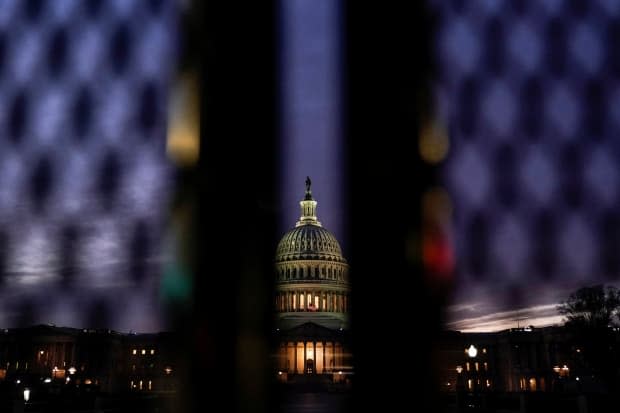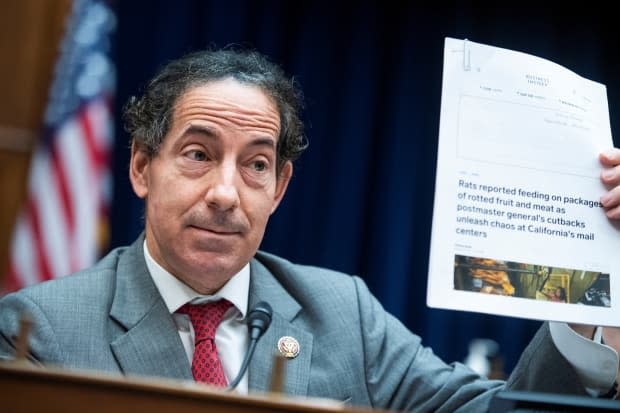U.S. House of Representatives poised to impeach Trump again — but to what end?

Donald Trump's norm-shattering presidency risks earning ignominious new distinctions over the coming days that will trail him into his post-presidency and far into the afterlife.
The U.S. president's political epitaph will carry the legacy of two upcoming votes in the House of Representatives, including on impeachment in the fallout of last week's mob attack on the U.S. Capitol that he's accused of inspiring.
Trump will soon likely become the only U.S. president impeached twice; the only president formally targeted for expulsion under the 25th amendment; and, possibly but far less likely, the only president convicted by the Senate and barred from ever seeking office again.
The first in this series of votes is expected Tuesday night after 7:30 p.m. ET. in the House.
"The president represents an imminent threat to our Constitution, our country and the American people, and he must be removed from office immediately," House Speaker Nancy Pelosi, a Democrat, said Monday.

"The president's threat to America is urgent, and so too will be our action."
Pelosi laid out a two-step plan that begins with a vote on the 25th amendment to the U.S. constitution, enacted in the wake of John F. Kennedy's assassination.
It allows a change in leadership if a body of Congress, the vice president, and more than half the cabinet agree to oust the president.
Plan A and Plan B
Given the slim chances of Vice-President Mike Pence and the majority of the cabinet turning on the president, Democrats have prepared Plan B for the next day, an article of impeachment to be voted on as early as Wednesday that accuses the president of inciting an insurrection for his role in the attack on the U.S. Capitol last week.
The resolution noted that Trump addressed a rally shortly before his supporters mounted the attack and says he made statements that "encouraged and foreseeably resulted in" the lawless actions at the Capitol.

Impeachment appears to have the votes to pass the House, based on its Democratic support alone although it could also attract a few Republicans.
The question many will ask, and Republicans are certainly asking, is: Why now? Trump is slated to leave office in a week and has just promised a peaceful transition.
The main Republican argument against impeachment is that this move will drop a match on a country that's a political tinder box.
Top Republican pushes back on impeachment
That tinder box already shows signs of blowing — the FBI warns of plans for armed protests across the country; there is chatter on social media about militia attacks; at least 10,000 National Guard troops are being called to the capital; and even the Washington Monument is being shut down amid threats.
Republicans are urging their rivals to move on, and let President-elect Joe Biden launch his presidency under unifying terms, focused on enacting his own agenda.
Even one Democratic senator thinks this is a poor idea.
Joe Manchin of West Virginia called this a terrible moment for impeachment: "This is so ill-advised," Manchin told Fox News. He predicted impeachment would fail again in a Senate trial just like it did last year, and only sour the start of Biden's presidency.

That's because an impeachment might not even get to a Senate trial until after the presidential transition — raising the question of what difference this now makes.
Two arguments for impeaching now
Impeachment supporters offer two retorts to that.
One is principled; the other practical.
On the matter of principle, they say the current U.S. president richly deserves this reprimand that will stain his legacy, and say it also establishes necessary boundaries for future presidential behaviour.
Some legal scholars interviewed agreed Trump deserves this sanction.
Joseph Ellis is a Pulitzer Prize-winning historian who participates in published rankings of the best to worst presidents in history.
"The second impeachment will solidify that certainty that Donald Trump will be listed last [on the lists of best to worst president]," Ellis said.
"Without question Trump is the worst president in American history."

He said the president, in his opinion, has probably committed five or six known impeachable acts throughout his presidency.
Then there's a practical reason — and it has more to do with the four-year period ahead of us than the four years we've just witnessed.
It's about whether Trump can be stripped of his political power going forward, a power that stems in part from his ability to run for office again.
Could strip Trump of ability to run again
It's notable that the impeachment article drafted by Democratic lawmakers refers to the Constitution's 14th amendment. Written after the Civil War, it forbade anyone engaged in insurrection from ever again seeking political office.
So if the House impeaches Trump, Senate Republicans will have two hot potatoes to handle.
One is the obvious question of whether to convict Trump. The second, arguably more consequential, question: If the Senate did actually convict him, what penalty would it impose?
That punishment could include disqualification from future office, which would require a simple majority vote, according to historical precedent in non-presidential impeachment cases.
Don't automatically assume Senate Republicans will be as supportive of Trump as the last time he was impeached.
One observer suspects many Washington Republicans would love to bury Trump politically. Legal ethics scholar Clark Cunningham said they would have a variety of motivations for wanting to sideline Trump — including those with their own ambition to run for president in 2024.
"I think very few people in the Senate, including Republicans, want Donald Trump running for president again or exercising substantial leadership in this country," said Cunningham, a professor of law and ethics at Georgia State University.
WATCH | There could be violence at Biden's inauguration, FBI warns:
"I don't think there's any question about that."
That's why Cunningham thinks Democrats should try building bipartisan consensus however possible, including in the drafting of the impeachment article.
Republican: We're scared of Trump supporters
He says the current wording is a mistake. Cunningham said proving that someone incited an insurrection is too complicated, hinging on interpretations of the definition of "incitement" and "insurrection." Cunningham says seditious conspiracy would have been a simpler allegation to prove.
Republicans have another reason to fear going along with this, one that speaks to the gravity of this American political moment.
It involves angering people like that mob that stormed the Capitol.
A rookie congressman from Michigan, Republican Peter Meijer, wrote in an op-ed about the terror his colleagues face. He said he knows one lawmaker who voted to overturn the election results last Wednesday night out of fear that family members might be harmed.
Meijer, who voted to confirm Biden's presidency, said: "I have been called a traitor more times than I can count. I regret not bringing my gun to D.C."
It's still early to gauge the political effects of last week: some polling suggests Trump's support has dropped to its lowest level in three years, and that Republicans oppose the Capitol storming, but other polling suggests Republicans overwhelmingly wanted Biden's win overturned and were split on the riot.
The first dilemma belongs to Trump's vice-president.
WATCH | Law prof says there are few options to remove Trump from office:
Pence received death threats on social media sites, including Twitter and Parler, since presiding over the congressional ceremony certifying Biden's win. His relationship with Trump is publicly strained.
And if the House of Representatives tonight votes to invoke the 25th amendment, the next move is his, in deciding whether to try getting a majority of the cabinet to boot Trump.
There's no way that happens, said one law professor who wrote a prescient book before the election on scenarios that might unfold if Trump refused to admit defeat.
Lawrence Douglas told CBC News that he can't imagine Pence enraging the majority of Republican voters.
"[Maybe] if we lived in a less deformed political landscape," said the professor at Amherst College.
"I can't imagine Mike Pence doing that. We need to distinguish between what should happen and what's going to happen. I really cannot imagine Mike Pence doing that."
Then it's on to impeachment — again.

